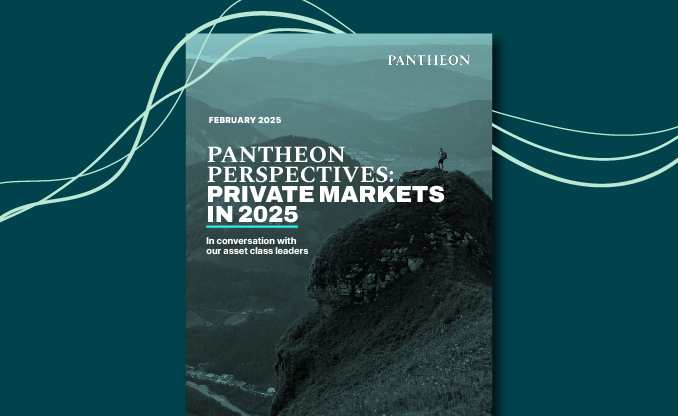AMG Pantheon Credit Solutions Fund (P-SECC)
The AMG Pantheon Credit Solutions Fund (P-SECC) is a secondaries focused investment strategy that seeks to build a diversified portfolio of high-quality private credit investments, with the potential to generate strong, risk-adjusted total returns and an attractive income stream.
- Core private credit exposure through a single allocation with diversification across manager, geography, underlying loans, and industry sectors
- Access to unique private credit secondaries deal flow from Pantheon’s global platform
- Evergreen allocation tool with immediate exposure and quarterly liquidity
Fund Documents
RELATED CONTENT
Fund Net Asset Value (NAV) $606m as of January 31, 2025. The Advisor intends to recommend quarterly repurchases of Units representing up to 5% of the Fund’s NAV, although such recommendations may exceed 5% of the Fund’s NAV, subject to Board approval.
Important Disclosures
Investors should carefully consider the Fund’s investment objectives, risks, charges and expenses before investing. For this and other information, please call 1-877-355-1566 or download a free prospectus. Read it carefully before investing or sending money. This information is not an offer to sell securities issued by AMG Pantheon Credit Solutions Fund, LLC (the “Fund”). Investors should consider the Fund’s investment objective, risks, charges and expenses carefully before investing. Everyone cannot invest like an institution. Institutions are professional money managers who have unique access and the ability to perform extensive due diligence on managers. Many investors’ experience, financial means, objectives, risk tolerance, and time frame will differ from that of institutions, and they may not be able to access the same investment opportunities as institutions. These factors should be taken into consideration when creating an allocation to alternatives. Diversification does not ensure profit nor protect against loss. All investors in the Fund must be “Accredited Investors,” as defined in Regulation D under the Securities Act of 1933. The Fund is a non-diversified, closed-end investment company designed for long-term investors and not as a trading vehicle. The Fund has limited operating history upon which investors can evaluate potential performance. The Fund differs from open-end investment companies in that investors do not have the right to redeem their units on a daily basis. Instead, repurchases of units are subject to the approval of the Fund’s Board of Directors. The Fund’s units represent illiquid securities of an unlisted closed-end fund, are not listed on any securities exchange or traded in any other market, and are subject to substantial limitations on transferability. LIQUIDITY IN ANY GIVEN QUARTER IS NOT GUARANTEED. YOU SHOULD NOT INVEST IN THE FUND IF YOU NEED A LIQUID INVESTMENT. The Fund will invest substantially all of its assets in AMG Pantheon Master Fund, LLC (the “Master Fund”). This investment structure is commonly referred to as a “master-feeder” fund arrangement. The investment advisor of the Fund and the Master Fund is Pantheon Ventures (US) LP (the “Advisor”). The Master Fund is non-diversified, which means that it may be invested in a relatively small number of underlying funds or portfolio companies, which subjects the Master Fund, and therefore the Fund, to greater risk and volatility than if the Master Fund’s assets had been invested in a broader range of issuers. No assurance can be given that the Master Fund’s investment program will be successful. An investment in the Fund should be viewed only as part of an overall investment program. An investment in the Fund is speculative and involves substantial risks. It is possible that investors may lose some or all of their investment. In general, alternative investments such as private equity or infrastructure involve a high degree of risk, including potential loss of principal invested. These investments can be highly illiquid, charge higher fees than other investments, and typically do not grow at an even rate of return and may decline in value. In addition, past performance is not necessarily indicative of future results.
In addition to all of the risks inherent in alternative investments, an investment in the Fund involves specific risks associated with private equity investing. Underlying funds and many of the securities held by underlying funds may be difficult to value and will be priced in the absence of readily available market quotations, based on determinations of fair value, which may prove to be inaccurate. Fund investors will bear asset-based fees and expenses at the Fund and Master Fund levels, and will also indirectly bear fees, expenses and performance-based compensation of the underlying funds. Underlying funds will not be registered as investment companies under the Investment Company Act of 1940, as amended (the “1940 Act”), and the Master Fund’s investments in underlying funds will not benefit from the protections of the 1940 Act. The value of the Master Fund’s investments in underlying funds will also fluctuate and may decline. The Fund’s investment portfolio through the Master Fund will consist of primary and secondary investments in private equity funds that hold securities issued primarily by privately held companies (“Investment Funds”), co-investments, ETFs, cash and cash-equivalents. Many of such investments involve a high degree of business and financial risk that can result in substantial losses. Subject to the limitations and restrictions of the 1940 Act, the Master Fund may use derivative transactions, primarily equity options and swaps, for hedging purposes. Options and swaps transactions present risks arising from the use of leverage (which increases the magnitude of losses), volatility, the possibility of default by a counterparty, and illiquidity. Use of options and swaps transactions for hedging purposes by the Master Fund could present significant risks, including the risk of losses in excess of the amounts invested. Additionally, the Master Fund may invest in ETFs. The risk of ETFs designed to track equity indexes may include passive strategy risk (the ETF may hold constituent securities of an index regardless of the current or projected performance of a specific security or a particular industry, market sector, country, or currency, which could cause returns to be lower or higher than if an active strategy were used), non-correlation risk (the ETF’s return may not match the returns of the relevant index), equity securities risk (the value of equity securities will rise and fall in response to the activities of the company that issued them, general market conditions, and/or economic conditions), market trading risks (the ETF faces market trading risks, including losses from trading in secondary markets and disruption in the creation/redemption process of the ETF), and concentration risk (to the extent the ETF or underlying index’s portfolio is concentrated in the securities of a particular geographic or market segment, the ETF may be adversely affected by the performance of that particular geographic or market segment, may be subject to increased price volatility, and may be more susceptible to adverse economic, market, political, or regulatory occurrences affected by that particular geographic or market segment). The Master Fund may invest, including for defensive purposes, directly and indirectly, some or all of its assets in high quality fixed-income securities, money market instruments and money market mutual funds, or hold cash or cash equivalents in such amounts as the Advisor or general partner, manager or equivalent of the underlying Investment Fund (the “Investment Fund manager(s)”) deem appropriate under the circumstances. In addition, the Master Fund or an Investment Fund may invest in these instruments pending allocation of its assets, and the Master Fund will seek to retain cash or cash equivalents in sufficient amounts to satisfy capital calls from Investment Funds. Money market instruments are generally high quality, short-term fixed-income obligations, which typically have remaining maturities of one year or less and may include U.S. Government securities, commercial paper, certificates of deposit and bankers acceptances issued by domestic branches of U.S. banks that are members of the Federal Deposit Insurance Corporation, and repurchase agreements. The performance of these investments may be adversely affected by tax, legal, legislative, regulatory, credit, political or government changes, interest rate increases and the financial conditions of issuers, which may pose credit risks that result in issuer default.
Investment products are not FDIC insured, are not bank guaranteed and may lose value.
AMG Distributors, Inc. is a wholly owned subsidiary of AMG Funds LLC and Pantheon Ventures (US) LP is majority owned by Affiliated Managers Group, Inc. (AMG).
AMG Funds are distributed by AMG Distributors, Inc., a member of FINRA/SIPC.




